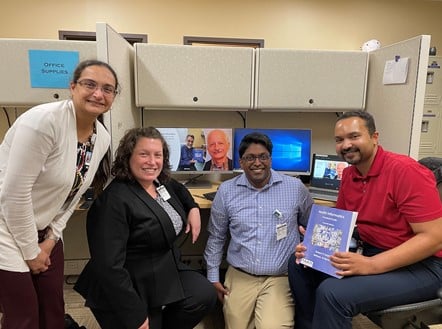
Interview: Kettering Health Clinical Informatics Fellowship Director
Kettering Health Clinical Informatics Fellowship with SEMI Chair-Elect, Carrie Baker
Interviewed by Indira Gowda

Carrie Baker, DO, MS, FACEP
SEMI Chair-Elect
Clinical Informatics Fellowship Program Director
Director of Medical Informatics Education and Innovation
Kettering Health

Kettering Health Clinical Informatics Fellowship review “Health Informatics” by Hoyt and Hersh.
(Left to right): Sunita Mall, Carrie Baker, Nikhil Kurapati, Mohammed Abdelaziz
(Erica Glancy, not pictured)
What is your current title?
Kettering Health (KH) Director of Medical Informatics Education and Innovation, Clinical Informatics Fellowship Program Director
What is your educational background?
In 2019, I graduated from Oregon Health and Science University (OHSU) with a Master of Science in Biomedical Informatics. I genuinely love lifelong learning. I am a former professional photojournalist with an Art degree as well as a B.A. in Chemistry from the University of Missouri at Kansas City. I completed medical school at Des Moines University, a surgical internship at Philadelphia College of Osteopathic Medicine and EM residency at KH Dayton (formerly known as “Grandview”).
How did you become interested in Informatics?
As a resident in 2012, I proposed a Quality Improvement project to transition the ED from a paper call schedule to a software solution. I reached out to hospital leadership, our call center, charge nurses, physician practice leaders, and Information Systems. This solution made it easier for practices to update accurate call schedules for the ED and other care providers. Due to the success of this pilot project, KH launched a software call schedule for the rest of the network, which has seven full-service hospitals, 11 centers, and more than 120 outpatient facilities in Greater Dayton and Northern Cincinnati.
How long have you been a PD of an informatics program?
As the founding program director, we submitted our ACGME application in late 2019, receiving ‘initial accreditation’, and launched our program in 2020.
What were some of the challenges of starting a new CI Fellowship?
Time management. Fellows have longitudinal projects that overlap with their rotations. They work on projects with multiple teams, including Process Excellence, Project Management, Quality Improvement, and IS, while taking online classes from OHSU. Multiple, competing priorities can be a challenge for anyone working in informatics. Teaching these skills, while giving them exposure to all the areas of informatics as outlined by the American Board of Preventive Medicine to become board certified presents a challenge. https://www.theabpm.org/become-certified/exam-content/clinical-informatics-content-outline/
There are currently 39 CI Fellowships in the country, according to FREIDA https://freida.ama-assn.org/search/list?spec=42666,42741,43096,42706,42766&page=2. Do you think this number is growing and why?
Yes. The number is growing. My mentor, Dr. William Hersh, said it best in his article, “Who are the Informaticians?” from JAMIA in 2006. A workforce is needed to develop, implement and evaluate healthcare information technology for optimal quality, safety, and cost-efficiency in healthcare.
The majority of CI-trained docs went the practice pathway route, but as this is closing in 2022 do you think there will be an increase in interest in CI fellowships?
Looking at a recent study by Desai et al (AMIA 2020) it looks like the number of CI-certified docs is dropping off since 2016. Since the practice pathway closes in 2022, more clinicians will seek opportunities to complete clinical informatics fellowships to become board certified.
I heard that you’re working to reformat the milestones for fellowship. How are you doing this? What are some things you would like to see changed/improved?
I am fortunate to have the opportunity to work with ACGME and national leaders in the field of Clinical Informatics to revise the Clinical Informatics Milestones. Howard Silverman is one of the leaders I have the opportunity to work with. He is the first author of the landmark paper, “Domains, tasks, and knowledge for clinical informatics subspecialty practice: results of a practical analysis” https://academic.oup.com/jamia/article/26/7/586/5481062 which was used to update the ABPM board certification criteria. We are guided by this work as well as the new “harmonized milestones” that cross specialties for ACGME evaluations. https://www.acgme.org/Portals/0/PDFs/Milestones/HarmonizingPROF.pdf?ver=2018-12-06-140544-443
What are some of the areas for improvement in CI Fellowship. For example - Standardization. It seems a lot of fellowships lack standardization and do you think this is a good or bad thing? How can we incorporate more standardization into fellowships?
As the Clinical Informatics Fellowship Program Director (CIPD), I am on the American Medical Informatics Association (AMIA) CIPD Education Sub-Committee, led by Dr. Veena Lingam. The committee started a shared didactics series based on content where one program may have more resources for a specific area of expertise. For example, ACEP member and Cybersecurity expert, Dr. Christian Dameff, will present to all fellows in AMIA. He is also the featured guest speaker at this year’s ACEP SA21.
Where do you see the majority of CI Fellows landing in the next 5-10 years after fellowship? Academics, Industry, Community?
All of the above. Dr. John Manning, ACEP SEMI leader and Google
Development expert outlined those who provide care (internal), support care (external) and oversee care (policy) in conjunction with knowledge, operations and innovations for careers in informatics. Dr. Manning suggests categories of work, including academic informatician, CMIO/CCIO, Healthcare technology entrepreneur, advisory board, Chief Digital Officer, Chief Strategy Officer, Implementation consultant, or Chief Innovation Officer (design sprints, agile, lean, startups/accelerators).
https://www.thieme-connect.de/products/ejournals/pdf/10.1055/s-0039-1701021.pdf
Do you think there will be a growing demand for CI-trained docs?
Yes. As the transition from volume to value continues to grow, informaticians will be highly sought after to analyze data, improve efficiency and optimize patient care outcomes.
What are your goals for your fellowship?
My goal is to expand to Wright Patterson Air Force Base and the Dayton VA. Kettering Health recently hired CMIO, Dr. Albert Bonnema (former US Air Force CMIO and Defense Health Agency Chief Health Information Officer). I am excited to have the opportunity to work for him! I want to develop a workforce to support our military, as well as civilians, in the community setting. Additionally, I’m happy to share that Kettering Health also hired Dr. Thomas Graham as the Chief Innovation and Transformation Officer (former Chief Innovation Officer at Cleveland Clinic and Director of Strategy and Innovation at NYU Langone). I hope to develop opportunities for my fellows to work with him in the innovation space.
ACEP and AMIA leader, Dr. Jeff A. Nielson, will join Kettering Health as faculty for both EM and Informatics in October. I know he will contribute greatly to our academic endeavors!
How have the applicants changed over the years? Diversity, number, background?
We have only had two years of applicants. So it is hard to specify a trend at this point. We have had a diverse group of applicants with various backgrounds.
What makes someone successful in a CI Fellowship? How can they get the most out of their fellowship?
Successful CI Fellows are engaged, interactive, hard-working, collaborative and open to new ideas. They need to be able to think outside the box to solve real problems and creatively problem-solve. They need “soft skills” to work with hospital leaders and multidisciplinary teams.
How can CI docs add value to their healthcare system?
Per ABPM, core content of clinical informatics include: Improve care delivery and outcomes through clinical decision support, analyzing workflows, process improvement, quality improvement, support innovation in health systems, develop and deploy health information systems, data governance and analytics, and leadership skills. https://www.theabpm.org/become-certified/exam-content/clinical-informatics-content-outline/



